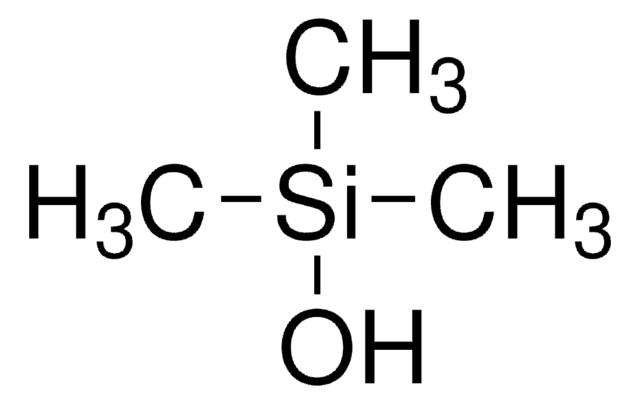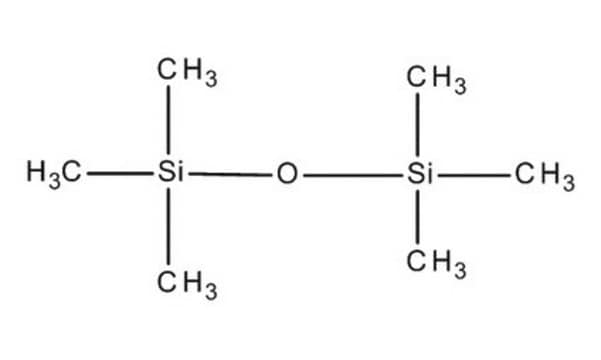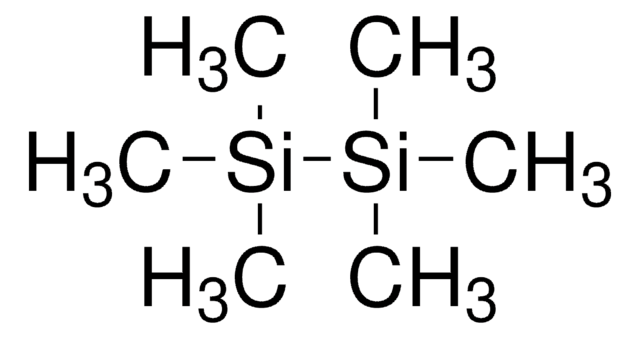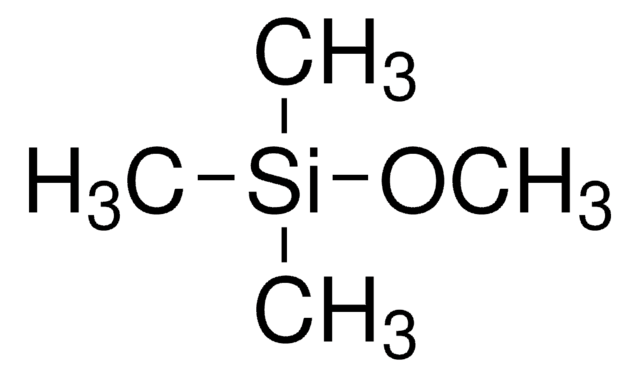All Photos(3)
About This Item
Linear Formula:
(CH3)3SiOSi(CH3)3
CAS Number:
Molecular Weight:
162.38
Beilstein/REAXYS Number:
1736258
EC Number:
MDL number:
UNSPSC Code:
12352103
PubChem Substance ID:
NACRES:
NA.22
Recommended Products
vapor density
>1 (vs air)
Quality Level
assay
≥98%
form
liquid
refractive index
n20/D 1.377 (lit.)
bp
101 °C (lit.)
101 °C
mp
−59 °C (lit.)
density
0.764 g/mL at 20 °C (lit.)
SMILES string
C[Si](C)(C)O[Si](C)(C)C
InChI
1S/C6H18OSi2/c1-8(2,3)7-9(4,5)6/h1-6H3
InChI key
UQEAIHBTYFGYIE-UHFFFAOYSA-N
Looking for similar products? Visit Product Comparison Guide
General description
Hexamethyldisiloxane (HMDSO), a linear polydisiloxane, is an organosilicon reagent commonly utilized as a source for plasma enhanced chemical vapor deposition (PE-CVD) of thin films of silicon compounds. It is also employed as a substitute to silane in silicon integrated circuit technology. Its dissociative ionization by electron impact has been studied by Fourier transform mass spectrometry. Synthesis of plasma-polymerized HMDSO thin films by atmospheric pressure glow (APG) discharge has been reported. Crystals of HMDSO at 148K are monoclinic. Addition of HMDSO to P4S10, improves its efficiency as thionating agent.
Application
Hexamethyldisiloxane can be used:
- To fabricate a gas diffusion layer (GDL) with controlled hydrophobic silicone nano-layer by the dry deposition process.
- To prepare silver nanoparticles coated with silica using arginine and glucose as the catalyst and the reducing agent, respectively.
signalword
Danger
hcodes
Hazard Classifications
Aquatic Acute 1 - Aquatic Chronic 1 - Flam. Liq. 2
Storage Class
3 - Flammable liquids
wgk_germany
WGK 2
flash_point_f
21.2 °F - closed cup
flash_point_c
-6 °C - closed cup
ppe
Eyeshields, Faceshields, Gloves, type ABEK (EN14387) respirator filter
Choose from one of the most recent versions:
Already Own This Product?
Find documentation for the products that you have recently purchased in the Document Library.
Customers Also Viewed
Israel Sifuentes-Nieves et al.
International journal of biological macromolecules, 144, 682-689 (2019-12-21)
In the present study, the effect of plasma treatment on the structural properties of three granular corn starches (normal, Hylon V and Hylon VII) was investigated. Thermal (TGA/DSC), structural (XRD/FTIR) and chemical (XPS) properties were evaluated. Plasma treatment resulted in
Tae-Jun Ko et al.
ACS applied materials & interfaces, 7(9), 5506-5513 (2015-02-18)
Reliable operation of a proton exchange membrane fuel cell requires proper water management to prevent water flooding in porous carbon materials such as the gas diffusion layer (GDL). In contrast to the conventional GDL that uses the "wet" dip-coating process
Thin films deposition from hexamethyldisiloxane and hexamethyldisilazane under dielectric-barrier discharge (DBD) conditions.
Schmidt-Szalowski K, et al.
Plasmas and polymers, 5(3-4), 173-190 (2000)
Philippe Saint-Cricq et al.
Journal of materials chemistry. B, 1(19), 2451-2454 (2013-05-21)
Mesoporous silica-coated silver nanoparticles (Ag@MSN) were prepared by a two step synthesis in an environment friendly way. Arginine and glucose were used as a catalyst for the formation of silica and as a reducing agent for silver ions, respectively, in
Thomas J Curphey
The Journal of organic chemistry, 67(18), 6461-6473 (2002-08-31)
The combination of P4S10 and hexamethyldisiloxane efficiently converts esters, lactones, amides, lactams, and ketones to their corresponding thiono derivatives. In the presence of elemental sulfur, 3-oxoesters are converted to dithiolethiones by this reagent. Yields are comparable to or superior to
Our team of scientists has experience in all areas of research including Life Science, Material Science, Chemical Synthesis, Chromatography, Analytical and many others.
Contact Technical Service












